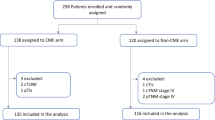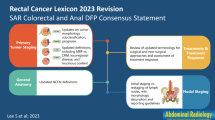Abstract
Background
Laparoscopic total mesorectal excision (TME) is associated with a steep learning curve, but the learning curve for robotic TME is unknown. This study aimed to evaluate the learning curve for robotic TME.
Methods
Between November 2004 and April 2009, 80 patients underwent robotic TME performed by a single surgeon. The operative experience was divided into two groups: group 1 (the first 40 cases) and group 2 (the subsequent 40 cases). Patient demographics, operative characteristics, and morbidities were compared.
Results
The two patient populations selected did not differ statistically in age, body mass index (BMI), preoperative risk assessment, stage, preoperative chemoradiotherapy, or tumor location. The mean operative times in group 1 (310 min) and group 2 (297 min) were similar (p = 0.55), and the mean robotic TME time did not differ between the two groups (60 vs. 64 min; p = 0.65). In addition, the operative times did not improve during the course of the study. There were no differences in EBL, margin status, or number of lymph nodes harvested. Furthermore, there were no differences in conversion rate, time to resumption of diet, length of hospital stay, or postoperative complications.
Conclusion
Robot-assisted TME may attenuate the learning curve for laparoscopic rectal cancer resection. Further studies are necessary to establish the role of robotic surgery in minimally invasive rectal operations.

Similar content being viewed by others
References
Aziz O et al (2006) Laparoscopic versus open surgery for rectal cancer: a meta-analysis. Ann Surg Oncol 13:413–424
Barlehner E et al (2005) Laparoscopic resection for rectal cancer: outcomes in 194 patients and review of the literature. Surg Endosc 19:757–766
Bretagnol F et al (2005) The oncological safety of laparoscopic total mesorectal excision with sphincter preservation for rectal carcinoma. Surg Endosc 19:892–896
Dulucq JL et al (2005) Laparoscopic rectal resection with anal sphincter preservation for rectal cancer: long-term outcome. Surg Endosc 19:1468–1474
Hartley JE et al (2001) Total mesorectal excision: assessment of the laparoscopic approach. Dis Colon Rectum 44:315–321
Jayne DG et al (2007) Randomized trial of laparoscopic-assisted resection of colorectal carcinoma: 3-year results of the UK MRC CLASICC Trial Group. J Clin Oncol 25:3061–3068
Leroy J et al (2004) Laparoscopic total mesorectal excision (TME) for rectal cancer surgery: long-term outcomes. Surg Endosc 18:281–289
Morino M et al (2005) Laparoscopic versus open surgery for extraperitoneal rectal cancer: a prospective comparative study. Surg Endosc 19:1460–1467
Morino M et al (2003) Laparoscopic total mesorectal excision: a consecutive series of 100 patients. Ann Surg 237:335–342
Hellan M et al (2007) Short-term outcomes after robotic-assisted total mesorectal excision for rectal cancer. Ann Surg Oncol 14:3168–3173
Pigazzi A et al (2006) Robotic-assisted laparoscopic low anterior resection with total mesorectal excision for rectal cancer. Surg Endosc 20:1521–1525
Purkayastha S et al (2004) Does laparoscopic surgery offer adequate clearance in rectal cancer? A discussion. Int J Surg 2:103–106
Rockall TA, Darzi A (2003) Robot-assisted laparoscopic colorectal surgery. Surg Clin North Am 83:1463–1468 Xi
Delaney CP et al (2003) Comparison of robotically performed and traditional laparoscopic colorectal surgery. Dis Colon Rectum 46:1633–1639
Hance J, Rockall T, Darzi A (2004) Robotics in colorectal surgery. Dig Surg 21:339–343
Prasad SM et al (2002) The effect of robotic assistance on learning curves for basic laparoscopic skills. Am J Surg 183:702–707
Vibert E, Denet C, Gayet B (2003) Major digestive surgery using a remote-controlled robot: the next revolution. Arch Surg 138:1002–1006
Weber PA et al (2002) Telerobotic-assisted laparoscopic right and sigmoid colectomies for benign disease. Dis Colon Rectum 45:1689–1694 discussion 1695–1696
Pruthi RS, Smith A, Wallen EM (2008) Evaluating the learning curve for robot-assisted laparoscopic radical cystectomy. J Endourol 22:2469–2474
Heald RJ (1995) Total mesorectal excision is optimal surgery for rectal cancer: a Scandinavian consensus. Br J Surg 82:1297–1299
Heald RJ et al (1998) Rectal cancer: the Basingstoke experience of total mesorectal excision, 1978–1997. Arch Surg 133:894–899
Heald RJ, Ryall RD (1986) Recurrence and survival after total mesorectal excision for rectal cancer. Lancet 1:1479–1482
Heald RJ, Ryall RD (2004) A comparison of laparoscopically assisted and open colectomy for colon cancer. N Engl J Med 350:2050–2059
Abraham NS, Young JM, Solomon MJ (2004) Meta-analysis of short-term outcomes after laparoscopic resection for colorectal cancer. Br J Surg 91:1111–1124
Guillou PJ et al (2005) Short-term endpoints of conventional versus laparoscopic-assisted surgery in patients with colorectal cancer (MRC CLASICC trial): multicentre, randomised controlled trial. Lancet 365:1718–1726
Lacy AM et al (2002) Laparoscopy-assisted colectomy versus open colectomy for treatment of non-metastatic colon cancer: a randomised trial. Lancet 359:2224–2229
Veldkamp R et al (2005) Laparoscopic surgery versus open surgery for colon cancer: short-term outcomes of a randomised trial. Lancet Oncol 6:477–484
Agachan F et al (1997) Laparoscopic colorectal surgery: do we get faster? Surg Endosc 11:331–335
Park IJ et al (2009) Multidimensional analysis of the learning curve for laparoscopic colorectal surgery: lessons from 1,000 cases of laparoscopic colorectal surgery. Surg Endosc 23:839–846
Reissman P et al (1996) Laparoscopic colorectal surgery: ascending the learning curve. World J Surg 20:277–281 discussion 282
Schlachta CM et al (2000) Determinants of outcomes in laparoscopic colorectal surgery: a multiple regression analysis of 416 resections. Surg Endosc 14:258–263
Senagore AJ, Luchtefeld MA, Mackeigan JM (1995) What is the learning curve for laparoscopic colectomy? Am Surg 61:681–685
Simons AJ et al (1995) Laparoscopic-assisted colectomy learning curve. Dis Colon Rectum 38:600–603
Tekkis PP et al (2005) Evaluation of the learning curve in laparoscopic colorectal surgery: comparison of right-sided and left-sided resections. Ann Surg 242:83–91
Ito M et al (2009) Influence of learning curve on short-term results after laparoscopic resection for rectal cancer. Surg Endosc 23:403–408
Leung KL et al (2004) Laparoscopic resection of rectosigmoid carcinoma: prospective randomised trial. Lancet 363:1187–1192
Menon M et al (2002) Laparoscopic and robot assisted radical prostatectomy: establishment of a structured program and preliminary analysis of outcomes. J Urol 168:945–949
Ahlering TE et al (2003) Successful transfer of open surgical skills to a laparoscopic environment using a robotic interface: initial experience with laparoscopic radical prostatectomy. J Urol 170:1738–1741
Hanisch E, Ziogas D (2009) Beyond quality-of-life improvement: how robotic surgery for low anterior resection with total mesorectal excision also may improve oncologic outcomes. Surg Endosc 23:2662–2664
Disclosures
Alessio Pigazzi acts as a consultant for Intuitive Surgical, Sunnyvale, CA. Yasir Akmal, Shaun McKenzie, Jeong-Heum Baek, and Julio Garcia-Aguilar have no conflicts of interest or financial ties to disclose.
Author information
Authors and Affiliations
Corresponding author
Rights and permissions
About this article
Cite this article
Akmal, Y., Baek, JH., McKenzie, S. et al. Robot-assisted total mesorectal excision: is there a learning curve?. Surg Endosc 26, 2471–2476 (2012). https://doi.org/10.1007/s00464-012-2216-5
Received:
Accepted:
Published:
Issue Date:
DOI: https://doi.org/10.1007/s00464-012-2216-5




